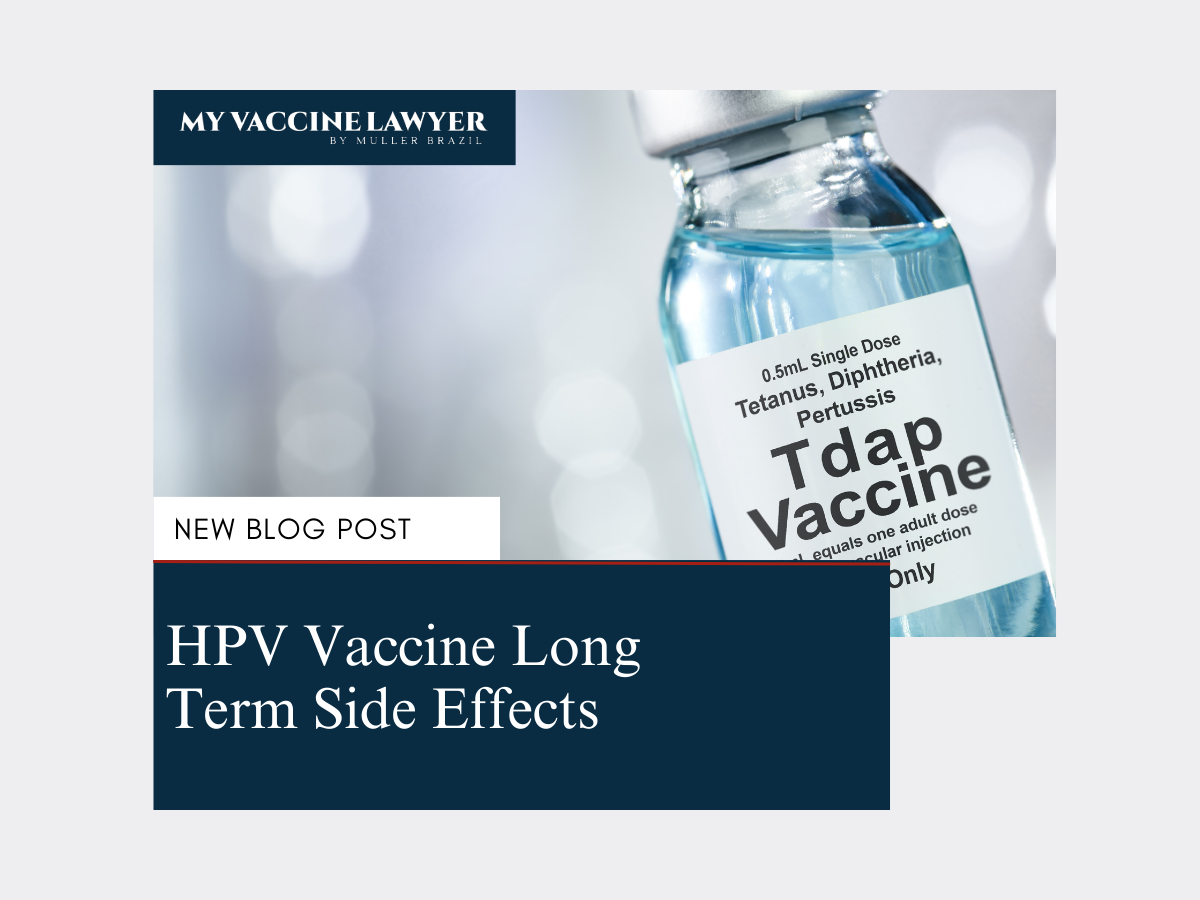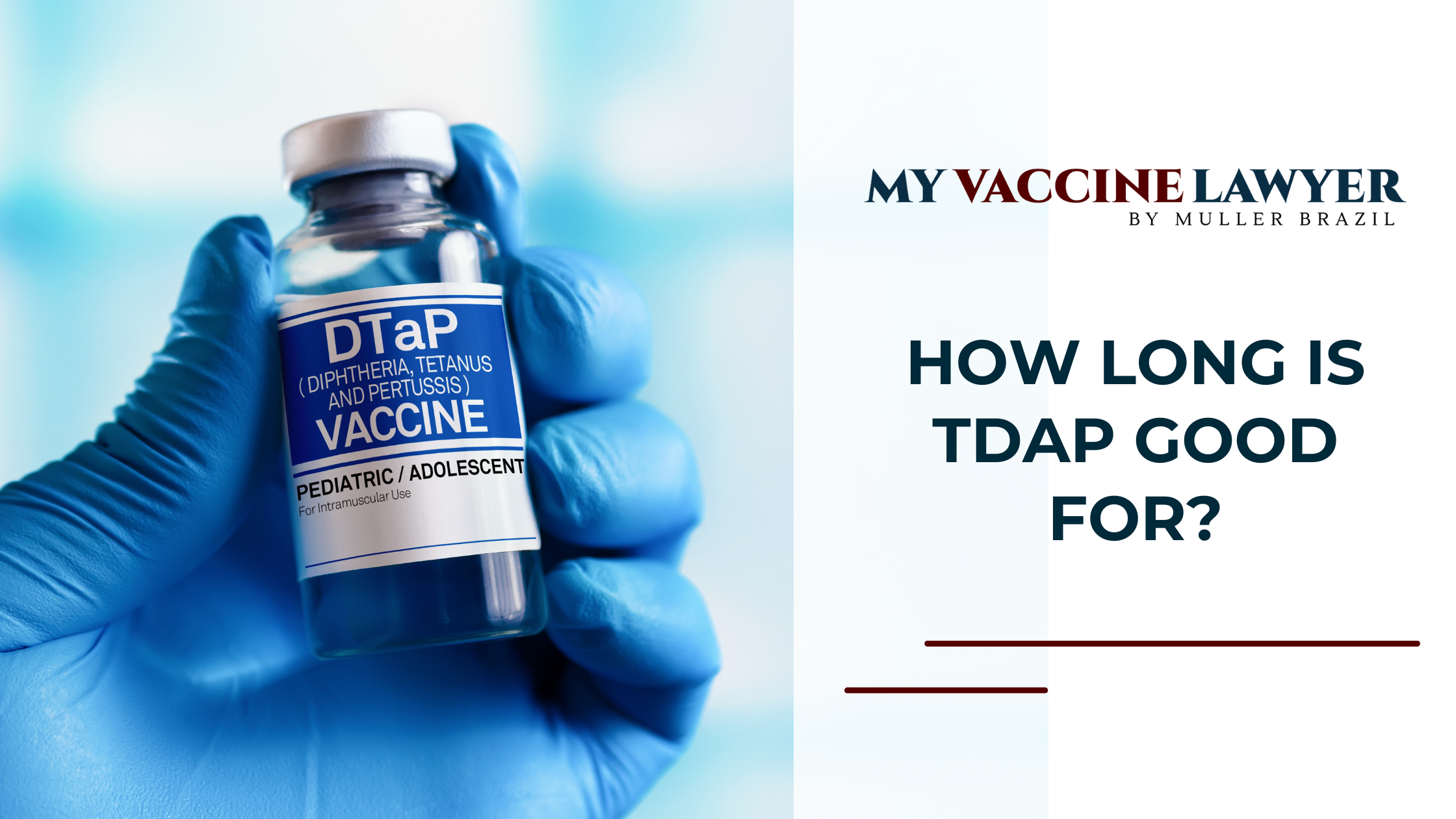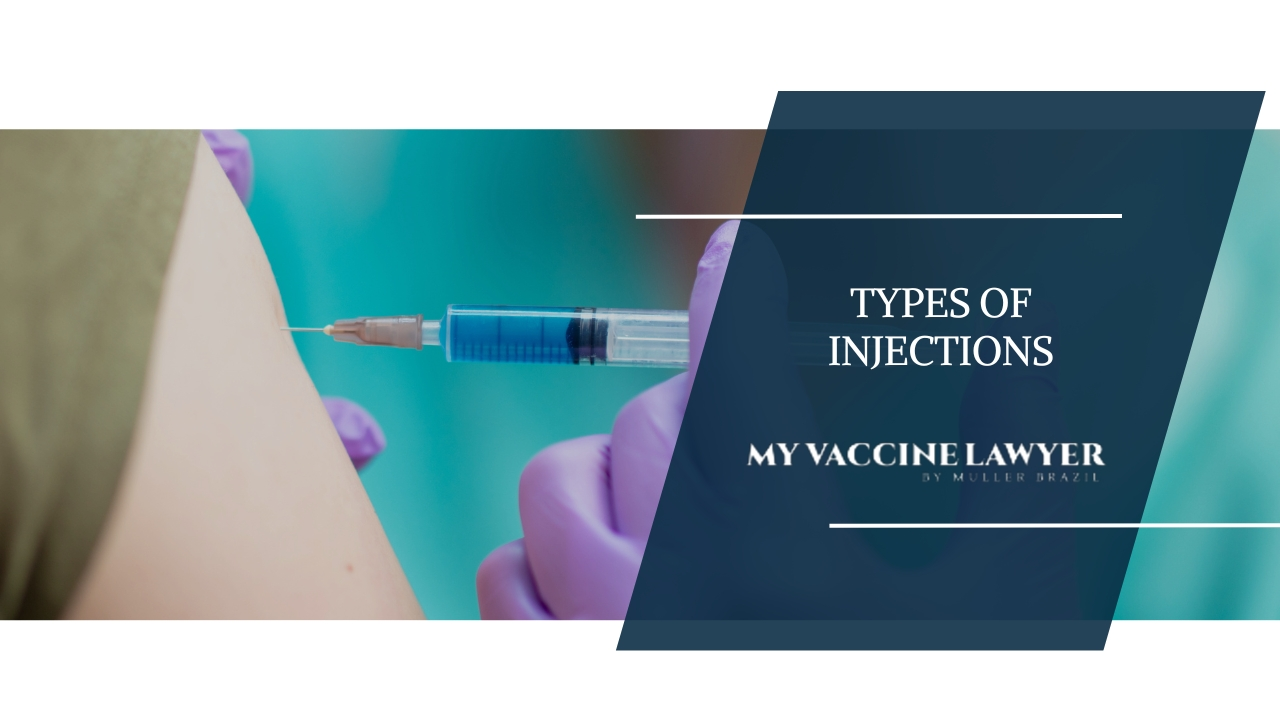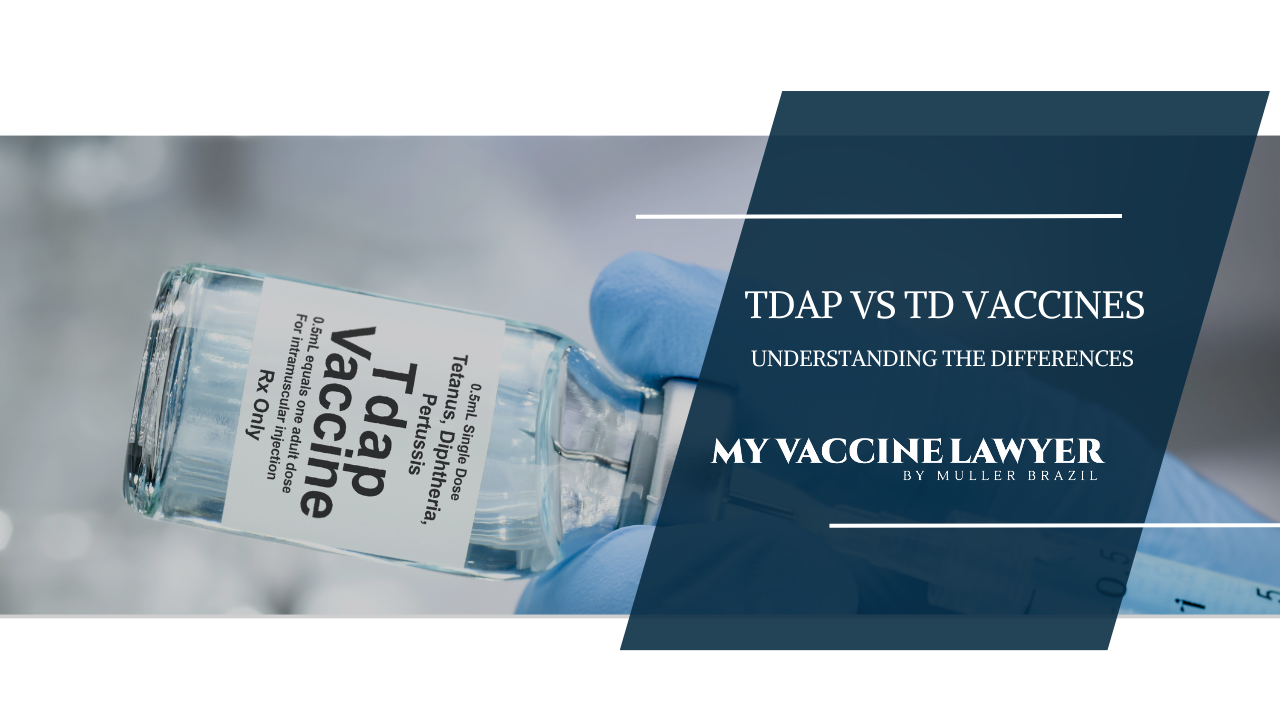Shoulder Pain from Tdap Shot
The Tdap vaccine is an immunization that protects against three serious diseases: tetanus, diphtheria, and pertussis (whooping cough). While the...
8 min read
Vaccine Injury Law Resources / Types of Vaccine / Tdap vs. Td Vaccines: Key Differences Explained
 Paul Brazil
:
Dec 7, 2023 3:50:33 PM
Paul Brazil
:
Dec 7, 2023 3:50:33 PM
Vaccination is important in protecting our health and preventing the spread of potentially life-threatening diseases. When protecting against tetanus and diphtheria, understanding the differences between Tdap and Td vaccines is essential for making informed decisions for yourself and those around you.
In this blog post, you’ll learn about the key distinctions between these vaccines, their age-based recommendations, potential side effects, and their overall effectiveness in the context of tdap vs td.
Tdap and Td vaccines are engineered to immunize against tetanus and diphtheria, with Tdap also covering pertussis (whooping cough). The key distinction between these two vaccines lies in their target diseases.
The Tdap vaccine protects against tetanus, diphtheria, and pertussis; the Td vaccine only offers protection against tetanus and diphtheria. Both vaccines are essential in preventing serious consequences and potential fatalities associated with these bacterial infections.
For a more comprehensive understanding of Tdap and Td vaccines, we’ll examine each vaccine and the specific diseases they protect against.
The Tdap vaccine is a combination vaccine that protects against tetanus, diphtheria, and pertussis (whooping cough), making it one of the pertussis vaccines available. It stimulates the immune system to produce antibodies against these diseases, granting immunity and preventing infection.
The vaccine Tdap, specifically recommended for older children and adults, is a pertussis vaccine, while the DTaP vaccine is designed for younger children.
Given as an injection into the muscle, usually in the upper arm or thigh, the Tdap vaccine is designed with lesser quantities of diphtheria and pertussis proteins than the DTaP vaccine. This makes sure that the vaccine is suitable for older children and adults, providing the necessary protection against these life-threatening diseases.
On the other hand, the Td vaccine, also known as the diphtheria vaccine, provides immunity against diphtheria and tetanus, acting as a diphtheria vaccination and protecting individuals from becoming severely ill.
Comprising tetanus toxoid and diphtheria toxoid, the Td vaccine is typically administered as a booster dose every 10 years to maintain protection against these bacterial infections. The tetanus vaccine may also be given earlier in cases of severe and unclean wounds or burns. It is important to have access to diphtheria vaccines to guarantee public safety.
The first dose of the Td vaccine is recommended between 15 and 18 months of age, making sure that individuals receive adequate protection against diphtheria and tetanus from a young age. Like the Tdap vaccine, the Td vaccine is given via an injection into the muscle, offering vital immunity against these potentially fatal diseases.
The recommendations for Tdap and Td vaccines vary by age, with DTaP vaccines advised for young children and Tdap and Td vaccinations for older children and adults. Young children are at a higher risk of severe complications from diseases like diphtheria, tetanus, and pertussis, emphasizing the importance of age-appropriate vaccination.
As individuals age, their immune systems mature, and they may require booster doses or different vaccines to maintain immunity. These age-based recommendations make sure that individuals receive the most effective and appropriate protection against diseases at different stages of life.
We’ll examine the specific age-based guidelines for DTaP vaccines in young children and Tdap and Td vaccines in older children and adults.
DTaP vaccines are given to children under 7 in five doses to protect against diphtheria, tetanus, and pertussis. These vaccines are specifically designed for young children, as they have developing immune systems that require early protection against potentially severe diseases. The schedule for the DTaP vaccine series commences at 2 months of age and continues with doses at:
This vaccination schedule guarantees that young children receive adequate protection against these life-threatening diseases, reducing the risk of severe complications and even death from diphtheria, tetanus, and pertussis.
For older children and adults, the following vaccines are recommended to provide ongoing protection against tetanus, diphtheria, and pertussis:
Following these age-based guidelines allows individuals to sustain adequate immunity against diphtheria, tetanus, and pertussis throughout their lives, reducing the spread of these diseases and encouraging overall health and well-being.
In addition to age-based recommendations, Tdap and Td vaccine schedules include booster shots and catch-up immunizations for those who have missed doses. Booster shots reinforce the immune response and help long-term immunity against tetanus and diphtheria.
Catch-up immunizations, on the other hand, help individuals who have missed vaccine doses to receive the necessary protection against these diseases, preventing potential outbreaks and promoting overall community health.
We’ll scrutinize the significance and timetable of booster shots and the function of catch-up immunizations for those who have missed Tdap and Td vaccine doses.
A booster shot is recommended every 10 years for adults to maintain protection against tetanus and diphtheria. These boosters help to reinforce the immune response and guarantee long-term immunity against these bacterial infections. It is important to receive booster shots at the recommended times to continue protection against these potentially life-threatening diseases.
The recommended schedule for Tdap and Td vaccine booster shots includes a 3-dose series at 0, 1, and 6–12 month intervals, with one dose of Tdap preferably as the first dose, followed by either Td or Tdap boosters every 10 years. Following this schedule, individuals do their best to receive optimal protection against tetanus and diphtheria through the Tdap booster shot.
Catch-up immunizations protect against tetanus and diphtheria for those who have missed Tdap and Td vaccine doses. By following the recommended catch-up immunization schedule, individuals make sure that they receive adequate protection against these diseases and help prevent potential outbreaks in the community.
The catch-up schedule for Tdap and Td vaccines involves administering the Tdap vaccine as the first dose, followed by Td vaccines for subsequent doses. The catch-up schedule may vary depending on the individual’s age and previous immunization history, making it essential to consult a healthcare provider for personalized recommendations.
Special considerations for Tdap and Td vaccination include recommendations for pregnant women and contraindications for individuals with specific conditions. Vaccination during pregnancy is vital, as it offers protection against whooping cough for both the mother and the baby, with the antibodies from the vaccine also helping to protect the baby after birth until they can receive their vaccinations.
Contraindications and precautions should be discussed with a healthcare provider before receiving Tdap or Td vaccines, as some individuals may be at higher risk of adverse reactions.
We’ll scrutinize the specific guidelines for pregnant women and the contraindications to consider before receiving Tdap and Td vaccines.
Pregnant women are encouraged to follow the recommended health guidelines. One such recommendation is receiving a Tdap vaccine during the third trimester of pregnancy. This makes sure that the mother remains protected against whooping cough and allows the antibodies to be passed on to the fetus. This protects the newborn against the disease until they can receive their vaccinations.
Receiving the Tdap vaccine during pregnancy has been shown as safe and does not lead to birth defects or pregnancy complications. By following this recommendation, pregnant women play an active role in protecting their health and that of their newborns from serious diseases.
Contraindications and precautions should be discussed with a healthcare provider before receiving Tdap or Td vaccines, as certain individuals may be at higher risk of adverse reactions. Some contraindications for Tdap and Td vaccines include a serious allergic or hypersensitivity reaction to a previous dose and encephalopathy (coma, decreased level of consciousness).
Before administering Tdap and Td vaccines, screening patients for contraindications and precautions is essential. Screening makes sure that individuals receive the appropriate vaccines without unnecessary risks. If any adverse effects arise after vaccination, contacting the doctor immediately for further assessment and guidance is important.
Take Control of Your Injury Today
Potential side effects and risks of Tdap and Td vaccines include:
While most individuals experience mild side effects, it is important to be aware of the possibility of more severe reactions and seek immediate medical attention if necessary. Understanding the potential side effects and risks associated with these vaccines helps individuals make informed decisions about their vaccination and ensures that they receive the appropriate care if adverse reactions occur.
We’ll examine the potential side effects and risks of Tdap and Td vaccines, ranging from mild reactions to rare severe allergic reactions.
Mild side effects may include pain or swelling at the injection site, fever, and fatigue. These side effects are generally short-lived and are managed with over-the-counter pain medication, such as ibuprofen (Advil), to address the pain, redness, or swelling at the injection site. In case of severe pain, it is recommended to consult a healthcare professional. Mild side effects should diminish within a few days and typically do not require further medical intervention.
It is important to remember that while mild side effects may be uncomfortable, they are signs that the body is building immunity against bacterial infection, such as tetanus and diphtheria.
Severe allergic reactions to Tdap and Td vaccines are rare but can occur. Signs of a severe allergic reaction may include:
If any of these symptoms arise after receiving a Tdap or Td vaccine, it is crucial to seek immediate medical attention, as severe allergic reactions can be life-threatening.
By being aware of the potential side effects and risks associated with Tdap and Td vaccines, individuals take the necessary precautions and seek appropriate medical care if needed, guaranteeing the best possible protection against tetanus, diphtheria, and pertussis.
The effectiveness of Tdap and Td vaccines varies in terms of protection duration and vaccine efficacy rates. Both vaccines effectively protect against tetanus and diphtheria, with a protection duration of 2 to 3 years for Tdap and 30 years for Td. It is recommended to receive booster shots of the Td vaccine every 10 years to maintain adequate protection against tetanus and diphtheria.
We’ll look at the protection duration and vaccine efficacy rates for Tdap and Td vaccines to comprehend their overall effectiveness better.
The protection duration for Tdap and Td vaccines is generally up to 10 years. This means that to maintain protection against tetanus and diphtheria, individuals should receive booster shots every 10 years throughout their lives. Pregnant women should also receive a Tdap vaccine during the third trimester of each pregnancy to protect themselves and their newborns from pertussis.
Following the recommended vaccination schedule and receiving booster shots as needed, individuals help maintain adequate immunity against these diseases and help prevent potential outbreaks in the community. In doing so, vaccines protect both the individual and the community.
Vaccine efficacy rates for Tdap and Td vaccines are approximately 95% against diphtheria and tetanus. This means that vaccines are highly effective in protecting against these potentially life-threatening bacterial infections.
It is important to note, however, that the efficacy rate of Tdap vaccination against pertussis is reported to be approximately 53%, emphasizing the need for continued research and development to improve the vaccine’s effectiveness against this disease.
By understanding the vaccine efficacy rates for Tdap and Td vaccines, individuals can make informed decisions about their vaccination and make sure that they receive the most effective protection against tetanus, diphtheria, and pertussis.
In conclusion, understanding the differences between Tdap and Td vaccines, their age-based recommendations, and potential side effects is essential for making informed decisions about vaccination against tetanus, diphtheria, and pertussis.
By respecting the recommended vaccination schedules, individuals make sure that they receive the most effective protection against these potentially life-threatening diseases, preventing outbreaks and promoting overall health and well-being for themselves and their communities.
Tdap is a combination of three vaccines that protect against tetanus, diphtheria, and pertussis (whooping cough). Tetanus, also called lockjaw, is a disease caused by bacteria that affects the body's muscles and nerves. Tdap (Adacel® and Boostrix®) and Td (Tetanus and Diphtheria) vaccines protect against these diseases.
Adults should get one dose of the Tdap vaccine once during adulthood and follow up with a booster shot every 10 years. Pregnant women should receive the vaccine during each pregnancy, preferably during gestational weeks 27–36.
Tdap vaccine protects against three diseases: tetanus, diphtheria, and pertussis, while Td vaccine only offers protection against tetanus and diphtheria.
The DTaP vaccine is recommended for young children starting at two months of age and given in five doses until they reach 4-6 years old.
Yes, mild side effects are associated with Tdap and Td vaccines, such as pain or swelling at the injection site, fever, and fatigue. Severe allergic reactions are rare but can occur.
Paul Brazil is a native of Dunmore, Pennsylvania and a graduate of Dunmore High School. For his undergraduate education, he attended Bloomsburg University where he majored in political science. He then went on to earn his JD from Widener University School of Law. Following graduation from law school, Mr. Brazil worked at a large Philadelphia civil defense firm where he litigated workers’ compensation claims and Heart and Lung Act cases. In 2012, he joined with his coworker Max Muller to form Muller Brazil.

The Tdap vaccine is an immunization that protects against three serious diseases: tetanus, diphtheria, and pertussis (whooping cough). While the...

Vaccines have a powerful role in protecting against dangerous diseases, especially for older adults and individuals at high risk.

The proper administration of injections is critical in the healthcare field, and it’s beneficial to be aware of all their different types with...
